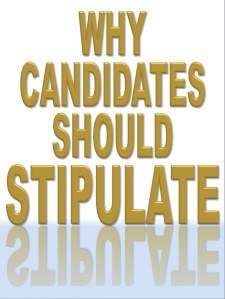 1) Mr. President and Governor Romney. There is a crime afoot that's been committed by politicians of both parties against the voters in almost every state, disenfranchising millions and distorting elections while giving partisan radicals the upper hand over moderate liberals and moderate conservatives. That crime is called gerrymandering -- the deliberate twisting of voting districts in order to create safe seats, a job security scam for politicians.
1) Mr. President and Governor Romney. There is a crime afoot that's been committed by politicians of both parties against the voters in almost every state, disenfranchising millions and distorting elections while giving partisan radicals the upper hand over moderate liberals and moderate conservatives. That crime is called gerrymandering -- the deliberate twisting of voting districts in order to create safe seats, a job security scam for politicians.
Everyone knows gerrymandering is dishonest and destructive, helping drag American politics away from negotiation and practicality toward total partisan war.
In a few states, like California, citizens have rebelled to end this dark practice, and already in that state republicans and democrats are talking to each other, like they used to, before culture war. What would you do, as president, to bring the foul gerrymandering habit to an end, and force politicians to work for a living, representing all citizens in their districts once again?
FOLLOWUP: Everyone knows the Electoral College is absurd, distorting elections almost as much as gerrymandering. To eliminate it would take a Constitutional Amendment and that it won't happen. But one simple measure would ensure the Electoral College matches the popular vote. Simply insist all states award their electors proportional to the votes cast in that state, instead of winner-takes-all. Two states already do this. Will you commit yourself to push for that simple reform?
 2) Mr. President and Governor Romney. Today, many Americans have narrowed their news inputs down to just one or two television channels and web sources that offer narrow, extreme views on the issues of our day. These channels -- found on both the far left and the far right -- push indignation and resentment till millions of Americans no longer consider members of the other party to be fellow citizens, only enemies in culture war.
2) Mr. President and Governor Romney. Today, many Americans have narrowed their news inputs down to just one or two television channels and web sources that offer narrow, extreme views on the issues of our day. These channels -- found on both the far left and the far right -- push indignation and resentment till millions of Americans no longer consider members of the other party to be fellow citizens, only enemies in culture war.
Is it time to bring back the Fairness Doctrine, which served our country well for so many years? If Sean Hannity or Keith Olberman get to rant at hypnotically captivated viewers for an hour, pushing one narrow perspective, shouldn't their viewers get to see serious questions or rebuttals by top level opponents? Say just one minute of response for every ten minutes Olberman or Hannity get to rant?
Look at how - right now in this debate - you are at your best, answering questions. Might just a few minutes each night, set aside for questions, shake us out of partisan stupor, arguing fairly with each other once again?
3) Governor Romney, why do you never mention the record of past Republican governance of the United States? The GOP held power more than the democratic party, across the last 30 years. Yet, you never speak the name of your Republican predecessor in the office you seek, even though you surround yourself with Bush officials and advisors and will put many of them back into positions of power. Can you cite for us right now any ways that America was statistically healthier in 2009 than it was in 2001? And if you can't, why should we re-hire you?
 4) President Obama, you promised a government that would be much more open to its citizens, yet you've only done a little to cut down on secrecy or to increase citizen oversight. Every year, elites of government, business, and personal wealth gather more information about American citizens while our ability to look-back decays. Yes, real government can be more complicated than a candidate's promises. But can we believe you, when you vow to get that promise back on track?
4) President Obama, you promised a government that would be much more open to its citizens, yet you've only done a little to cut down on secrecy or to increase citizen oversight. Every year, elites of government, business, and personal wealth gather more information about American citizens while our ability to look-back decays. Yes, real government can be more complicated than a candidate's promises. But can we believe you, when you vow to get that promise back on track?
5) Mr. President and Governor Romney, do you agree with each other about anything? Not motherhood or apple pie, or easy generalities like free enterprise or American greatness, or generalities about solving the debt, but some issue that would not win you votes? Some hard news that we, the people, really ought to hear, that politicians find difficult to say? For example: about the 70 year War on Drugs?
Will you promise that -- before the third debate -- you'll together issue one page of joint stipulations? Things that both of you think we need to hear, because you both agree not to attack each other for saying it?
----------
Okay, I try for questions that I hear nobody else asking. And I'll bet none of you have heard or seen these questions elsewhere.
As you might guess, I have tons of others that I'd love to poke at these fellows. And even more suggestions! Some will be posted later. One can hope that the network hosts -- even the candidates -- might raise them on their own.
Ah yes, hope. Though delusional, it springs eternal.
== Other matters: "Which 47%?" ==
Amid the furor over Mitt Romney's "inelegant" remarks about the 47% of Americans who are "freeloaders" -- who pay no net federal income tax (FIT) -- many rebuttals have shown that he slagged mostly retirees, lower middle class workers (who still pay payroll and other taxes), and even our fighting men and women who get their combat pay untaxed. (Along with a darned big slab of millionaires and corporations whose accountants and lawyers get them off scot free.) Note also that the fraction who pay no FIT had its biggest increase under George W. Bush.
What's astonishing is the fact that many let him get away with a conflation of two entirely separate statistics. The 55% of the public who support President Obama and the 47% who pay no FIT are supposed (by Romney) to completely overlap.
They do not. Yes, democrats still stand up for the very poor, and hence a third of the 47% do pretty much plop onto the democratic side. On the other hand it has long been the plain fact that Red America suckles in far more net tax dollars than it pays, while Blue America -- the wealth and productivity and innovation-generating areas -- pay more more in taxes than they get back… yet blue states whine about taxes much less. See the very starkly informative graphic below:
Of course it's more complicated than that. In fact, the conservative in me feels that all Americans should be asked to pay at least a small, token tax just to feel vested in how the money gets spent. It's one of many Goldwater style suggestions that could go on the table for negotiation… if today's conservatism still bore any resemblance at all to that of Goldwater and Buckley. (Barry how we miss you.)
== Political Miscellany ==
As perfect evidence of that drift, take this nonsense that Buckley and Golwater would never have stood for: "We're not going to let our campaign be dictated by fact-checkers," said Neil Newhouse, a Romney pollster. Of course Robert Reich is no conservative. But his point in this article is clear. Lacking any facts at all to support their side, and knowing full well that they dare never mention (at all) their record at governance, the Murdochians have completed their migration. They now say whatever they damn well please and let assertions stand in for truth. That is now the Red-Blue divide.
(When only 6% of U.S. scientists call themselves Republican, and every other clade of knowledge is under attack by Fox, this final shift can come as no surprise.)
Some of the heirs of Barry Goldwater have taken notice. Mike Lofgren, in The American Conservative (One of the few journals of the right that today would be considered sane by Goldwater and Buckley) has penned a scathing denunciation of how today's worldwide caste of uber-wealthy appear to be seceding from the nations and peoples they increasingly control. In "Revolt of the Rich," Lofgren shows how this process - bringing us toward wealth disparities like those of 1789 France - threatens the very fabric of our western/american social contract.
"It is no coincidence that as the Supreme Court has been removing the last constraints on the legalized corruption of politicians, the American standard of living has been falling at the fastest rate in decades. According to the Federal Reserve Board’s report of June 2012, the median net worth of families plummeted almost 40 percent between 2007 and 2010."
Here is another snippet:
"If a morally acceptable American conservatism is ever to extricate itself from a pseudo-scientific inverted Marxist economic theory, it must grasp that order, tradition, and stability are not coterminous with an uncritical worship of the Almighty Dollar, nor with obeisance to the demands of the super wealthy. Conservatives need to think about the world they want: do they really desire a social Darwinist dystopia?
"The objective of the predatory super-rich and their political handmaidens is to discredit and destroy the traditional nation state and auction its resources to themselves. Those super-rich, in turn, aim to create a “tollbooth” economy, whereby more and more of our highways, bridges, libraries, parks, and beaches are possessed by private oligarchs who will extract a toll from the rest of us. Was this the vision of the Founders? Was this why they believed governments were instituted among men—that the very sinews of the state should be possessed by the wealthy in the same manner that kingdoms of the Old World were the personal property of the monarch?"
If I might add, it would not end there. Read about Paris, 1789, and the Estates Generale. How the artistocratic First Estate demanded everything, conceded no obligations to the people, the state or society, and justified their exemption from taxes almost literally by calling themselves the job-creators.
In retrospect, and on a purely pragmatic basis, that was a very big mistake for those lords, an obstinacy that wound up costing them everything. It makes you wonder about the intelligence of the self-flattering aristocracy of our time.
Lofgren's whole article makes compelling reading and I suggest you recite it aloud to some conservative "ostrich" who seems sane enough to listen... and possibly even to stand up to reclaim the sadly hijacked movement of Barry Goldwater.
==See more of my articles on Politics for the 21st Century
==See more of my articles on Politics for the 21st Century

 The editorial goes on to cite surprising consensus in areas of National Security, Immigration, environment and social issues. The Times suggests that the thought of consensus, instead of Fox-style reflexive opposition, ought to be attractive, now and then.
The editorial goes on to cite surprising consensus in areas of National Security, Immigration, environment and social issues. The Times suggests that the thought of consensus, instead of Fox-style reflexive opposition, ought to be attractive, now and then.






